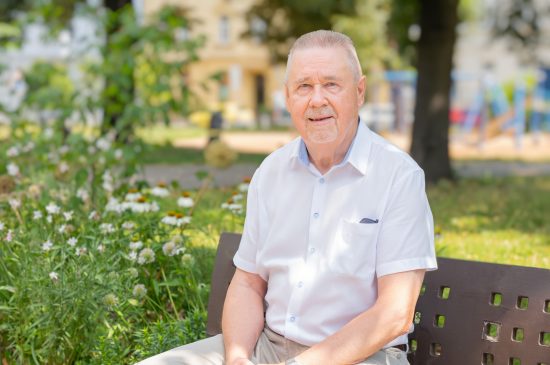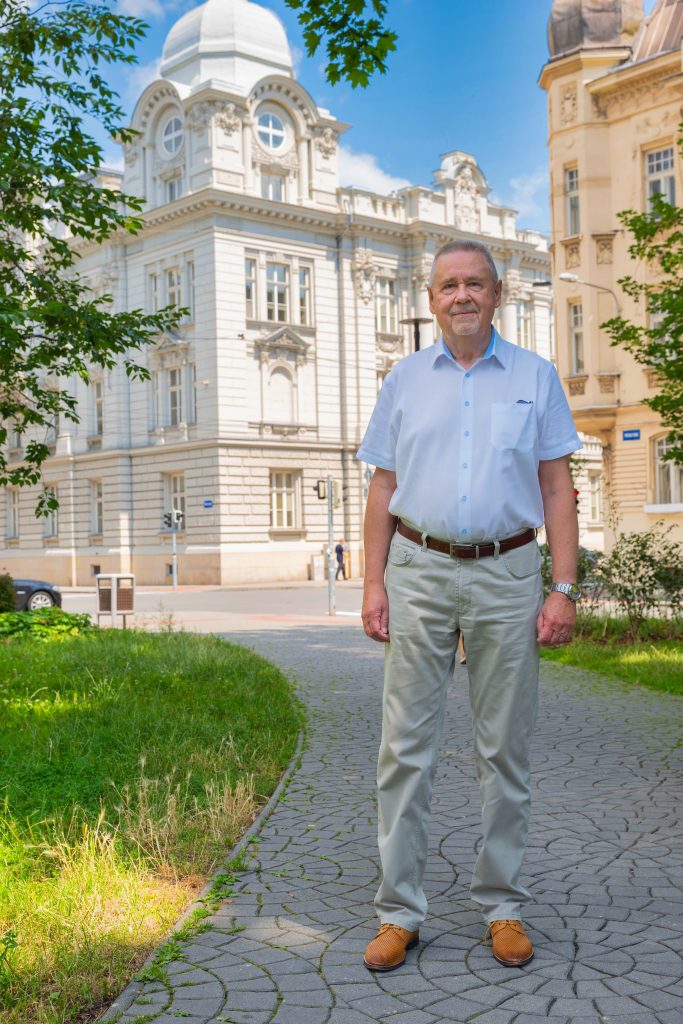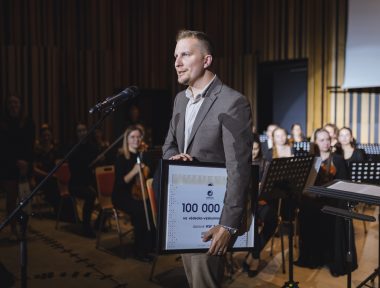When Prof. Oldřich Chytil, by a series of circumstances, began working as a social curator in Ostrava in 1973, he had no idea that this life episode would turn into his lifelong mission. On Wednesday, 16 July, Prof. Chytil celebrated his 80th birthday, marking his place as one of the most influential figures in Czech social work.
He was involved in its revival after 1968 and contributed significantly to shaping higher education in the field in the 1990s. He is also inseparably connected with the University of Ostrava: first with the establishment of the Medico-Social Faculty, and later the Faculty of Social Studies, where he served as dean for eight years.
Do you remember what brought you to social work? Was it more of a random impulse, or had you already felt drawn to the field?
In fact, it was total coincidence. A former classmate of mine started working as a social curator at the Ostrava City National Committee in the early 1970s. Soon after he wanted to move to another position, his supervisor told him he would only be released if he found his replacement. So, he called me to ask whether I might be interested in the job. In the end, we came to an agreement, and on 1 February 1973, I began working as a social curator. My encounter with social work was therefore accidental — but certainly a fortunate one.
How did you move from the position of a social curator to higher education in social work?
Back then it was already clear that social work lacked specialised higher education, which had existed in Czechoslovakia between 1945 and 1953. After 1989, together with colleagues—social workers from Prague and Brno—we sought to revive it. In 1990, I learned that Assoc. Prof. Vladimír Jochmann, whom I had known since the 1960s, had founded the Department of Sociology and Andragogy at the Faculty of Arts, Palacky University in Olomouc. I went to see him with a proposal on whether his department might prepare specialised education curricula for social workers.
But the situation took an unexpected turn — Assoc. Prof. Jochmann thought I was coming for a job interview for the position of assistant professor. I explained to him that I had a completely different reason for the visit, but in the end, he convinced me to apply for the selection process. When my then-supervisor agreed to let me go, I accepted the offer. And so, on 1 September 1990, I began working as an assistant professor at the Department of Sociology and Andragogy, with the task of developing a specialisation in social work.
How was university-level education in social work evolving at that time?
In the early 1990s, social work at universities existed only as a specialisation—in Olomouc within andragogy, in Brno for example within sociology. There was no unified framework for what education in social work should include.
At that time, I became part of a working group at the Federal Ministry of Labour and Social Affairs. It was a diverse team—colleagues from Czech and Slovak faculties, practitioners, and also international experts, for example from Great Britain, as well as Dr. Řezníček, who brought experience from the United States. Together we tried to reach a consensus on what quality education in social work should look like. The result was a document that Dr. Řezníček and I prepared, called the Minimum Standards for Education in Social Work. This became the first comprehensive proposal that could then be used as a foundation stone.
When the ministry ceased to exist after the dissolution of the federation, the idea emerged to establish the Association of Social Work Educators. I had the honour of being present at its founding — I worked with my colleagues on preparing the statutes, and I was eventually elected chair of an executive board. The Association then played an important role in unifying social work education and in establishing the very first Bachelor’s degree study programme.
What led you to return from Olomouc to Ostrava?
It was another coincidence – as has often been the case in my professional life. In the spring of 1993, on one Sunday, Assoc. Prof. Fischer, a neurosurgeon from the Ostrava University Hospital, knocked on my door. He told me that a new Faculty of Health and Social Studies was being established in Ostrava and that he had received a recommendation to contact me as an expert in social work. He asked whether I would be interested in teaching at the Faculty.
At the time, I was teaching in Olomouc and wasn’t planning on any changes, but eventually we agreed on a part-time position. And so, on 1 September 1993, I began lecturing at the newly established Faculty of Health and Social Studies, University of Ostrava, then still within the degree program of Health, Social, and Geriatric Care.
What is interesting is that when one time I was leaving Ostrava, my superior, the head of the Department of Social Affairs, told me at the farewell: “You’ll return to Ostrava one day. And I believe that you’ll establish a faculty of social work here.” At the time, I took it as a sweet compliment but did not take it seriously. Looking back now, I’m all the more surprised at how accurate his prediction turned out to be.
One time I was leaving Ostrava, my superior, the head of the Department of Social Affairs, told me at the farewell: “You’ll return to Ostrava one day anyway. And I believe that you’ll establish a faculty of social work here.”
How did you become involved in developing the field of social work at the University of Ostrava?
The initial impulse came almost by chance. I was already lecturing at the Faculty of Health and Social Studies and was also a member of the Scientific Council. At one of its meetings in 1994, the then Rector, Prof. Hubáček, came to me and said: “Dr. Chytil, if you want to apply for accreditation of a Master’s programme in Social Work, you will have my full support.” The offer surprised me, but at the same time, it was motivating—so I decided to take it on. I reached out to colleagues from Olomouc with whom I had long discussed such a programme, especially the philosopher Assoc. Prof. Hubík. Together, we began putting together a team and planning what the programme could look like.
Preparation for the accreditation was demanding. We needed highly qualified and experienced people to provide the expertise for the study programme. Colleagues from Olomouc and other leading experts in the field gave us valuable support. The result was the concept of “social work with a healthcare profile,” which drew on the faculty’s medical background. Thanks to great dedication—and also to some of Assoc. Prof. Hubík’s contacts—the accreditation was successful. And so, on 1 September 1995, a five-year Master’s programme was launched in Ostrava.
And if I’m not mistaken, this was the very first Master’s programme in Social Work in the Czech Republic.
Yes, it was. In preparing it, I greatly benefited from my international experience and contacts. Since 1992, I had been teaching regularly in Vienna, where I became familiar with their system of education and gained access to professional literature that was not yet available in our country. In 1994, thanks to a scholarship, I spent two months in Germany, where I established key contacts — for example with Prof. Baum from Koblenz, who later directly contributed to the development of our programme. It was precisely thanks to these international connections that we were able to launch the first Master’s programme in Social Work in the Czech Republic.
Let’s now move to the actual establishment of the Faculty of Social Studies. Where did the idea originate?
An initial impulse came in 2006 from the then rector of the University of Ostrava, Prof. Močkoř. He knew we had strong international connections, and that social work was a discipline deserving its own institutional foundation. He invited me to a meeting of the deans, where the question was raised whether the university should also have its own faculty of social sciences — to which everyone agreed.
I was entrusted with the preparation, which meant complex negotiations among the faculties and assembling a preparatory team. It took a year, and in January 2008 we received the Accreditation Commission’s approval to establish the faculty and to accredit the Bachelor’s, follow-up Master’s, and doctoral programmes in Social Work. And astonishingly enough, we succeeded on the first attempt — something quite rare when it comes to establishing a new faculty.
And you then became the first dean…
Yes, initially in 2008 I was entrusted with leading it, and in 2009 the academic community elected me as the official dean. It was the culmination of many years of effort, but also the beginning of a new phase.
I consider it essential that my colleagues strongly identified with the faculty – they truly believed in it, supported it, and were willing to do their best for its success.
You must surely have strong memories of your time as dean. Can you share some?
It was extremely demanding – I assumed a role of a dean at the age of 64, essentially building the faculty from scratch. Together with my colleagues who became vice deans – Dr. Krhutová and Assoc. Prof. Sýkorová – and with the teams of both departments, we worked to get the faculty up and running in terms of its organization and to keep it financially afloat.
Thanks to international contacts, particularly with the support of Prof. Gruber from the Vienna University of Social Work, I was able to secure funding for ten students in the follow-up Master’s programme for two years from the Austrian Erste Bank Foundation, keeping the programme alive. International collaboration became a strong part of our identity — we had dozens of partner schools, and significant experts from Germany, Poland, Austria, Finland, and the UK participated in teaching, including the PhD programme.
I consider it essential that my colleagues strongly identified with the faculty — they truly believed in it, supported it, and were willing to do their best for its success. That was very important to me. I knew I was not alone in this and felt the strong support of the entire team.
The spirit of openness and the search for new paths remained in Ostrava, and in my view, later carried over to the university.
Did you then have also time to work on developing social work as an academic discipline?
Yes, I did. And I must say, it was always something that fulfilled me, even though time was limited. As early as the 1990s, still at Palacký University, I realized through discussions with Associate Professor Hubík that if social work was to be taken seriously as an academic discipline, it had to be built on solid theoretical foundations. Practical teaching of skills alone was not enough. It was also essential to have a deeper reflection on why and how we do things.
I therefore began to focus intensively on social work theories. I was strongly influenced by the German theoretical discussion in social work, particularly the theoretical concepts of Profs. Hans Thiersch and Hans-Uwe Ott. Another source of my theoretical reservoir came from discussions with Prof. Silvia Staub-Bernasconi from Switzerland, Prof. Walter Lorenz from Italy, and Prof. Hämäleinän from Finland. All of whom also became my personal friends.
I was also greatly influenced by Prof. Jan Keller, both as a colleague and, more importantly, as a sociologist, who helped me realize that social work is inseparably linked with the development of modern society. This led me to a topic I continue to explore to this day — how modernization and societal changes influence the definition of social work’s objectives.
“The Ostrava School of Social Work,” if we may call it that, is relatively well-respected and successful. How do you explain that? Did any regional specifics play a role?
Yes, Ostrava really has specific conditions for the development of social work. Even before 1989, new approaches to social work with various target groups were being developed here — for example, with families and children, older adults, and individuals after serving prison sentences. Many innovations originated here, which were later adopted by other municipalities or the Ministry of Labour and Social Affairs. The spirit of openness and the search for new paths remained in Ostrava, and in my view, later carried over to the university.
The fact that we were not afraid to collaborate internationally also played a major role. The measure of quality for us was recognition of our teaching and research abroad. We did not build the faculty team by recruiting fully trained experts from outside; rather, it grew from our own graduates of the PhD programme. They were strongly connected to the faculty, identified with its vision, and stayed here even when they had offers elsewhere.
An important factor was also the approach to practical placements. From the beginning, we established a network of high-quality practice placement sites, and our students received regular feedback on their performance during practical training.
You often mention international contacts. I assume that ERIS—the European Research Institute for Social Work—which you founded and managed for many years, plays an important role here.
Yes, ERIS was officially established in 1998, and its founding members, besides the University of Ostrava, included five other European universities. I see the main contribution of this institute in its intensive support of international collaboration. Every year we organize the International Spring School for Master’s and PhD social work students in Ostrava, facilitate exchange stays for both students and teaching staff, and coordinate joint research projects. ERIS also contributes to the development of doctoral studies, for example by enabling our PhD students to have international consultation and through teaching by professors from partner universities.
Over the years, you’ve certainly experienced many challenging and amusing moments. Is there a story you like to recall that always makes you smile?
I have one such story. In 1994, I visited Frankfurt am Main intending to establish collaboration with the local university. I approached the department head, but he almost laughed at me, saying that the Czech Republic didn’t interest him at all. A few years later, I gave a lecture at the Federal Congress of Social Work in Mainz, and the same person came up to me after my presentation, admiringly offering collaboration. When I reminded him of our previous meeting, he just turned red and apologized. For me, it was a bit of sweet vindication and a proof of how recognition of Czech social work had changed over the years.
What has given you the greatest joy during your career? Something that was professionally truly important for you?
One of my most significant professional experiences was the international conference we organized in Ostrava in 1998 — it was the final meeting of a thematic network established by major European associations of social work schools. We managed to bring nearly 200 participants from 29 European countries, which was the very first event of this scale in Central and Eastern
Thanks to this, we opened the door to more contacts, and in 2005 I was even elected president of the European Centre for Community Education, one of the organizers of this conference. This was not only an honour for me personally, but above all proof that Czech—and Ostrava—social work has something valuable to offer to the world.
In my view, critical thinking is key for the development of social work as both an academic discipline and a professional field.
Professor, on the occasion of your important life milestone, on behalf of the entire university, let me wish you good health, happiness, and personal satisfaction. You have been active in the field of social work for over 50 years—what would you wish for it in the coming decades?
Thank you very much. First, I would like to say that I’ve been very fortunate in my life to be part of two crucial events in the evolution of social work: its revival after 1968, particularly in the field of rehabilitation work with people released from prison, and also the re-establishment of higher education in social work.
The most important thing I would wish for social work is that it preserves critical thinking. In my view, critical thinking is key for the development of social work as both an academic discipline and a professional field.


 13 min.
13 min. 




